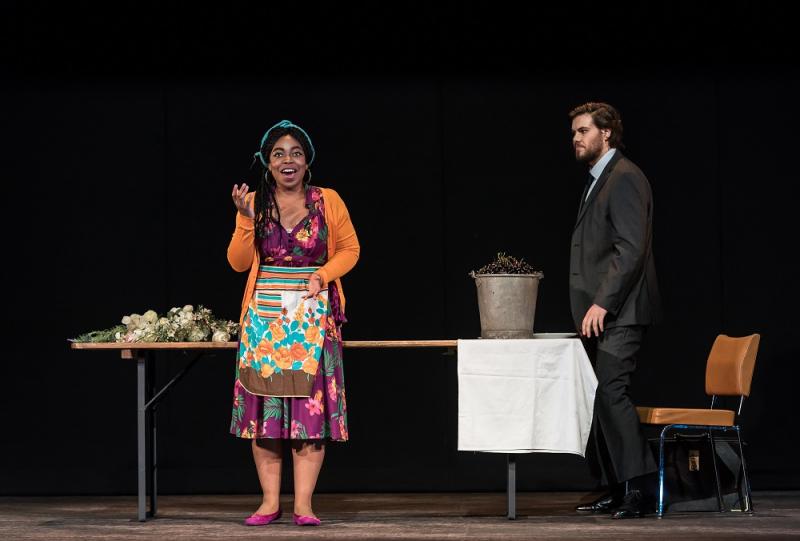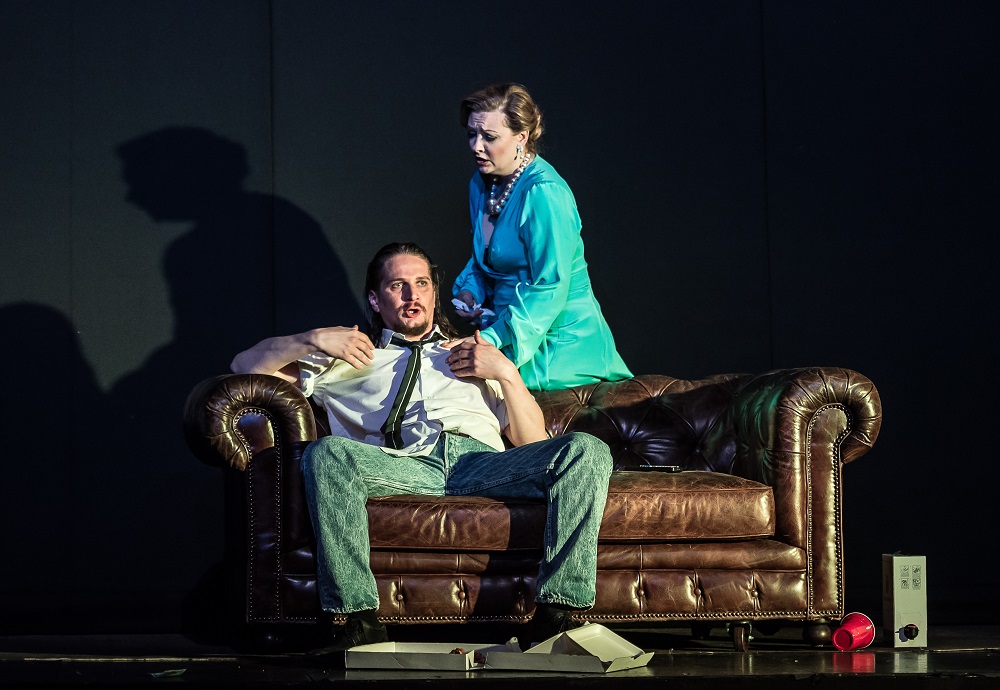Jette Parker Young Artists Summer Performance, Royal Opera review - vocal promise, poor stagecraft | reviews, news & interviews
Jette Parker Young Artists Summer Performance, Royal Opera review - vocal promise, poor stagecraft
Jette Parker Young Artists Summer Performance, Royal Opera review - vocal promise, poor stagecraft
Four standouts in a fine line-up which needed help with movements and gestures

They get to work with the best music and language coaches in the business. They make their mark in small parts throughout the Royal Opera season and showcase their art more prominently at the end of it, proving to the world that there are major talents among them (four outstanding ones, I reckon, on this showing).
I’ll get over the carping and celebrate the abundant excellence of this year’s singers shortly. But take the opening excerpt, early Verdi at his original best in the opening scene of I due Foscari's second act. Only a solo viola and cello set the sombre mood, superbly taken by Royal Opera principals under the experienced guidance of David Syrus. Tenor David Junghoon Kim proved as idiomatic as they, Italianate to the life; we saw that his Jacopo Foscari is in prison, we heard that he’s terrorised by phantoms. But who was this woman in smart business wear and high heels, circling him like a potential Miss Whippy and keeping her distance until he finally rushes unconvincingly into her arms? Supposedly his faithful wife Lucrezia, deeply concerned for him, but you wouldn’t know it from the way the two (pictured below) ended up standing apart and waving their arms about in repetitive gestures. Only the fine singing of the long phrases in the final stretta allowed Vlada Borovko to escape from the straitjacket in which director Gerard Jones had placed her. He'd already made a dog's dinner of the vocally excellent Wilton's Handel Oreste, sub-student style; that should have set alarm bells ringing.

And so it went on, in one poorly-etched scene after another. The second, the tender love-duet of Cinderella and her Prince Charming at the ball of Massenet’s Cendrillon, had a surprisingly ill-at-ease Angela Simkin, whom I've heard sing so much better, in the trousers role, a replacement for the unwell Emily Edmonds as the "unknown beauty", Kate Howden, and unidiomatic conducting from Matthew Scott Rogers. In what followed, three singers were truly at their ease – Nigerian-born American soprano Francesca Chiejina, radiant of facial expression and opulent of voice when needed opposite the equally stage-confident and vocally distinctive Thomas Atkins in a delicious little pastoral from Mascagni’s L’Amico Fritz, and Jennifer Davis, whom I’d already seen and heard excel alongside Atkins in this year's Europe Day Concert at St John’s Smith Square, amazing us with the ideal Straussian bloom at the top of the voice in the final scene of Arabella. Poor Gyula Nagy, as her Mr Right who’s gone and done everything wrong but is to be forgiven, had no help at all as the music of her staircase descent unfolded to an unseen slow entrance; Nagy's Mandryka was left to pace back and forth three times, to no effect, and vocally he didn't fit the part (it's essentially a bass-baritone rather than a baritone role). Amateurish blocking marred what should have been a very funny trio from Rossini’s Le comte Ory, too, though there was real promise in the crisp musical guidance of another Jette Parker Young Artist, repetiteur and conductor James Hendry.

With half the Second Act of Don Giovanni - from the great Sextet onwards - to conclude, we were on safer ground: known territory and an ideal sense of Mozartian pace and vitality from Syrus (having come straight from Haitink’s unsurpassable Mozart at the afternoon Prom, I was struck by the good fortune of getting his one-time sidekick at the Royal Opera as another ideal interpreter, and the singers must have been grateful, too). There wasn’t too much meddling with the arias. Davis’s "Mi tradi" (the soprano pictured above with Nagy) and Atkins’ "Il mio tesoro" were performances you’d be delighted to hear in a main Royal Opera production, very stylish, with excellent breath control, and dramatically firm; Borovko, less easy on stage, sang under the note in the slow section of "Non mi dir" but it was all there in essence - not easy in this fiendish aria - and she can manage the coloratura in the final sequence, unlike many Donna Annas I’ve heard.
Nagy seemed more in his element as Giovanni than as Mandryka; there had clearly been a lot of hard work on the Italian sparring with his Leporello, David Shipley. Jones G had clearly taken a leaf out of Jones R's playbook in a few touches; but the denouement still didn’t work. Much better the moral final ensemble, with the three singers from the Rossini scene – Chiejina, Simkin and Kim – incorporated to add lustre to a glamorous final line-up. All good enough to give hope for the future, and a pointer to at least four singers who have top-league careers ahead of them.
The future of Arts Journalism
You can stop theartsdesk.com closing!
We urgently need financing to survive. Our fundraising drive has thus far raised £49,000 but we need to reach £100,000 or we will be forced to close. Please contribute here: https://gofund.me/c3f6033d
And if you can forward this information to anyone who might assist, we’d be grateful.

Subscribe to theartsdesk.com
Thank you for continuing to read our work on theartsdesk.com. For unlimited access to every article in its entirety, including our archive of more than 15,000 pieces, we're asking for £5 per month or £40 per year. We feel it's a very good deal, and hope you do too.
To take a subscription now simply click here.
And if you're looking for that extra gift for a friend or family member, why not treat them to a theartsdesk.com gift subscription?
more Opera
 La bohème, Opera North review - still young at 32
Love and separation, ecstasy and heartbreak, in masterfully updated Puccini
La bohème, Opera North review - still young at 32
Love and separation, ecstasy and heartbreak, in masterfully updated Puccini
 Albert Herring, English National Opera review - a great comedy with depths fully realised
Britten’s delight was never made for the Coliseum, but it works on its first outing there
Albert Herring, English National Opera review - a great comedy with depths fully realised
Britten’s delight was never made for the Coliseum, but it works on its first outing there
 Carmen, English National Opera review - not quite dangerous
Hopes for Niamh O’Sullivan only partly fulfilled, though much good singing throughout
Carmen, English National Opera review - not quite dangerous
Hopes for Niamh O’Sullivan only partly fulfilled, though much good singing throughout
 Giustino, Linbury Theatre review - a stylish account of a slight opera
Gods, mortals and monsters do battle in Handel's charming drama
Giustino, Linbury Theatre review - a stylish account of a slight opera
Gods, mortals and monsters do battle in Handel's charming drama
 Susanna, Opera North review - hybrid staging of a Handel oratorio
Dance and signing complement outstanding singing in a story of virtue rewarded
Susanna, Opera North review - hybrid staging of a Handel oratorio
Dance and signing complement outstanding singing in a story of virtue rewarded
 Ariodante, Opéra Garnier, Paris review - a blast of Baroque beauty
A near-perfect night at the opera
Ariodante, Opéra Garnier, Paris review - a blast of Baroque beauty
A near-perfect night at the opera
 Cinderella/La Cenerentola, English National Opera review - the truth behind the tinsel
Appealing performances cut through hyperactive stagecraft
Cinderella/La Cenerentola, English National Opera review - the truth behind the tinsel
Appealing performances cut through hyperactive stagecraft
 Tosca, Royal Opera review - Ailyn Pérez steps in as the most vivid of divas
Jakub Hrůša’s multicoloured Puccini last night found a soprano to match
Tosca, Royal Opera review - Ailyn Pérez steps in as the most vivid of divas
Jakub Hrůša’s multicoloured Puccini last night found a soprano to match
 Tosca, Welsh National Opera review - a great company reduced to brilliance
The old warhorse made special by the basics
Tosca, Welsh National Opera review - a great company reduced to brilliance
The old warhorse made special by the basics
 BBC Proms: The Marriage of Figaro, Glyndebourne Festival review - merriment and menace
Strong Proms transfer for a robust and affecting show
BBC Proms: The Marriage of Figaro, Glyndebourne Festival review - merriment and menace
Strong Proms transfer for a robust and affecting show
 BBC Proms: Suor Angelica, LSO, Pappano review - earthly passion, heavenly grief
A Sister to remember blesses Puccini's convent tragedy
BBC Proms: Suor Angelica, LSO, Pappano review - earthly passion, heavenly grief
A Sister to remember blesses Puccini's convent tragedy
 Orpheus and Eurydice, Opera Queensland/SCO, Edinburgh International Festival 2025 review - dazzling, but distracting
Eye-popping acrobatics don’t always assist in Gluck’s quest for operatic truth
Orpheus and Eurydice, Opera Queensland/SCO, Edinburgh International Festival 2025 review - dazzling, but distracting
Eye-popping acrobatics don’t always assist in Gluck’s quest for operatic truth

Add comment